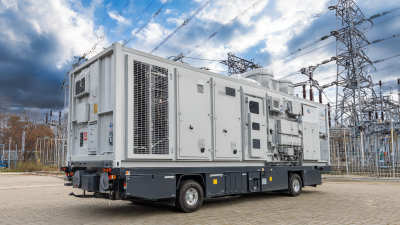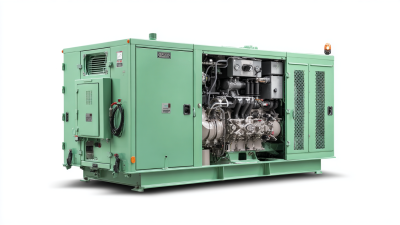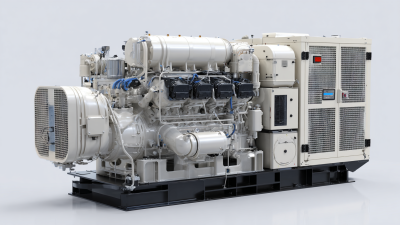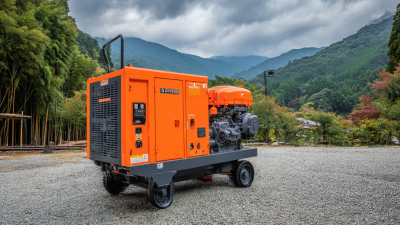50 Essential Tips for Choosing the Right 200kw Generator
Table of Contents
- Understanding Your Power Needs for Optimal Generator Selection
- Assessing Fuel Types: Pros and Cons of Diesel vs. Gas Generators
- Evaluating Noise Levels: Importance in Residential vs. Commercial Use
- Considering Mobility: Portable vs. Standby Generators
- Calculating Budget: Weighing Initial Costs Against Long-Term Value
- Key Features to Look For: Efficiency, Maintenance, and Warranty Options
- FAQS
- Conclusion
- Related Posts
Nowadays, with how fast everything’s changing in the industrial world, choosing the right equipment is more important than ever—especially when it comes to power generation. A 200kw generator isn’t just a piece of machinery; it’s a real game-changer for a bunch of different sectors like construction sites, telecoms, and hospitals. If you’ve been following market trends, you probably saw that the global generator market is expected to grow a lot, mainly because there's a rising need for dependable backup power solutions. At JIANGSU LONGEN POWER TECHNOLOGY CO., LTD., we’re proud to be right there at the forefront of this industry. We offer a wide range of diesel generators, including those powered by popular engines like Perkins, Cummins, and Mitsubishi. Our goal? To deliver reliable, high-quality products that fit the unique needs of our customers, helping them stay efficient and avoid unnecessary downtime. The 200kw generator, in particular, has become pretty popular—and for good reason, too.

Understanding Your Power Needs for Optimal Generator Selection
When you're choosing a 200kW generator, it’s really important to get a good handle on your actual power needs. I mean, according to the International Energy Agency, a lot of businesses and facilities tend to underestimate how much power they actually use. That can lead to running the generator inefficiently or even damaging equipment—definitely not what you want. So, it’s a smart move to take a close look at all the devices you'll need to power, including the critical systems and backup loads. Doing a thorough load analysis can help you spot both the peak and average power demands, making sure your generator can handle those fluctuations without breaking a sweat.
Also, the National Electrical Manufacturers Association points out that understanding load diversity is key when sizing a generator. Basically, not everything runs at full blast all the time, and factoring in this diversity can help you avoid overestimating what you need. For a 200kW setup, it’s pretty wise to leave about 20-30% extra headroom—kind of like a buffer—to handle startup surges from motors and other heavy loads. When you consider all these factors and pay attention to industry insights, you’ll be in a much better position to choose a generator that really matches your needs—reliable, efficient, and ready for anything.
50 Essential Tips for Choosing the Right 200kw Generator - Understanding Your Power Needs for Optimal Generator Selection
| Tip No. | Tip Description | Importance Level | Recommended Usage |
|---|---|---|---|
| 1 | Assess your total power requirements to avoid overloading. | High | For residential and commercial setups |
| 2 | Consider starting wattage needs for motors and appliances. | High | When powering large appliances |
| 3 | Plan for future power needs to avoid having to upgrade. | Medium | For expanding businesses or homes |
| 4 | Check fuel type options: diesel, gas, or propane. | Medium | Based on availability and usage cost |
| 5 | Evaluate noise levels, especially for residential areas. | Low | For urban installations |
| 6 | Review maintenance requirements and ease of service. | High | For long-term usage |
| 7 | Look into an automatic transfer switch for convenience. | High | For critical power needs |
| 8 | Research product reviews and user feedback extensively. | Medium | Before final purchase |
| 9 | Consider portability if planning to relocate the generator. | Low | For construction or temporary sites |
| 10 | Consult with a professional if in doubt about power needs. | High | When planning major installations |
Assessing Fuel Types: Pros and Cons of Diesel vs. Gas Generators
So, when you're looking at a 200kW generator, one of the big things you've got to think about is what kind of fuel it runs on. Diesel and gas generators each come with their own perks and quirks, and those can really impact how cost-effective and efficient they are in the long run. Diesel generators are kinda the workhorses—they're known for being tough and lasting a long time. Plus, they tend to sip fuel more efficiently, which makes them a solid pick for heavy-duty jobs. They're especially reliable if you're running them constantly in industrial setups, since diesel engines can handle bigger loads without overheating. That said, they can be a bit noisy and might pump out more emissions compared to gas models. On the flip side, gas generators are usually quieter and cleaner—better for the environment and great if you're dealing with smaller-scale stuff like residential use or light commercial applications. They also tend to be cheaper initially, which is a plus if you don’t want to break the bank upfront. But on the other hand, in some areas, gas might not be as easy to come by as diesel, especially in remote spots, so that’s something to keep in mind. As a top manufacturer, JIANGSU LONGEN POWER TECHNOLOGY CO., LTD. mainly focuses on diesel generator sets—they’ve got a variety of options that strike a good balance between power and running costs. We’re all about making sure our customers get reliable, efficient generators that fit their specific needs, combining good performance with manageable expenses.
Evaluating Noise Levels: Importance in Residential vs. Commercial Use
When you're choosing a 200kW generator, it’s really key to think about how noisy it might be—especially if you're trying to decide whether it’s for a home or a business. I read somewhere—like in a report from the National Institute of Standards and Technology—that loud noises can really affect the quality of life for folks living near commercial facilities. For homes, it's usually a good idea to keep the noise under about 55 decibels during the daytime, and try to stay below 45 at night, so you don’t get complaints from neighbors. Luckily, many modern generators nowadays come with smart sound-dampening tech to keep things quiet and within those limits.
On the flip side, in commercial places, the acceptable noise levels are often a bit different, mainly because of local rules and regulations. OSHA, for instance, recommends that workplace noise stays below 85 decibels over an 8-hour shift, so businesses need to make sure their generators don’t push past that—both for legal reasons and to keep employees and clients comfortable. When you’re checking out generators, it’s worth looking for ones that have built-in sound reducers or enclosures—they really make a difference in keeping things peaceful and compliant, whether you’re in a residential neighborhood or a busy workplace.
Considering Mobility: Portable vs. Standby Generators
When you're trying to pick out a generator, one of the big things to consider is mobility. It really often boils down to whether you want a portable unit you can take anywhere or a standby generator that's more for the long haul. The whole market for generators is booming, by the way—it's expected to grow from about $33.5 billion in 2025 to nearly $50 billion by 2032, with an annual growth rate of around 5.7%. That kind of growth just goes to show how much people are craving flexible power solutions these days—especially outdoor lovers and folks who want to be prepared for emergencies.

Now, portable generators have gotten pretty cool with newer models that come with built-in backpacks—perfect for hiking, camping, or any outdoor adventure. These guys aren’t just about keeping your gadgets powered; they also have space for your camera gear, drones, and other essentials. It totally suits the lifestyle of modern explorers who need power on the move. The best part? You can stay connected and powered up during your trips without any headaches—making these units super attractive if you value mobility.
On the flip side, standby generators serve a different purpose. They’re like having a reliable backup for your home, kicking in automatically when the power goes out. When you’re choosing between the two, it’s a good idea to think about whether you need something quick and portable or if you want a more permanent solution that keeps the lights on during emergencies. Knowing what each type offers can really help you make a smart choice that fits your lifestyle and power needs.
Calculating Budget: Weighing Initial Costs Against Long-Term Value
Thinking about getting a 200kw generator? One of the biggest calls you'll face is figuring out your budget. I know, the upfront costs can look pretty intimidating at first. But it’s worth taking a step back and thinking about the long-term value. I came across a report from Grand View Research that says the global generator market is expected to hit around $28.7 billion by 2025 — shows just how much we rely on dependable power these days. Choosing a generator that lasts longer and needs less maintenance can actually save you thousands over its lifetime, so it’s a smart move to keep in mind.
When you’re picking out a generator, I’d recommend focusing on models that are built to last and are energy-efficient. Here’s a little tip: check out brands that offer solid warranties. That’s often a good sign they believe in their product’s durability and it could save you money on repairs down the line. Also, think about the fuel type. Diesel generators tend to be more fuel-efficient and generally last longer than gas-powered ones, which means cheaper running costs over time.
And don’t forget to budget for installation and regular maintenance—that stuff adds up, but it’s all part of making a smart, well-informed choice. Pro tip: go for generators with advanced monitoring systems. They help you keep tabs on performance, boost efficiency, and can even prevent costly breakdowns before they happen. If you weigh your initial costs against the potential savings in the future, you’ll be better positioned to pick a generator that fits your budget and your needs — making the whole process a lot less stressful.
Cost Comparison of 200kw Generators: Initial Costs vs Long-Term Value
This chart illustrates the initial costs and the projected long-term value of four different 200kw generators. It provides a clear visual representation to help potential buyers weigh options before making a purchase decision.
Key Features to Look For: Efficiency, Maintenance, and Warranty Options
So, when you're shopping around for a 200kW generator, there are a few key things you really wanna keep in mind to make sure you’re making the right call for your power needs. First off, efficiency is a big deal—look for something that gives you the most bang for your buck in fuel use while still delivering enough power. Trust me, this can help cut down your running costs and even cut down on environmental impact. A generator that's pretty efficient over time can save you a decent chunk of cash, especially if your business runs nonstop.
Another thing to consider is maintenance. It’s super helpful if the generator is designed so that you can easily get to the parts that need checking or fixing. Regular maintenance isn’t just a chore; it actually helps the generator last longer and prevents those surprise breakdowns that can really hit your wallet. Plus, don’t forget to look into warranty options. A solid warranty usually tells you the manufacturer stands behind their product, giving you some peace of mind about its durability and reliability.

Here at Jiangsu Longen Power Technology Co., Ltd., we focus on providing high-quality diesel generator sets that come with reliable engines and alternators. We want to make sure you get a power solution that’s not just efficient but also built to last, tailored to what you actually need.
FAQS
: Portable generators are designed for mobility and convenience, making them ideal for outdoor activities and emergency situations. In contrast, standby generators provide automatic backup power to homes during outages, offering reliability for long-term use.
The global generator sales market is expected to grow from $33.56 billion in 2025 to $49.56 billion by 2032, with a compound annual growth rate (CAGR) of 5.73%, highlighting an increasing demand for flexible power solutions.
It's important to weigh initial costs against long-term value, considering factors like lifespan, maintenance costs, fuel efficiency, and installation expenses to make a strategic financial decision.
Different fuel types affect operational costs and lifespan. Diesel generators typically offer better fuel efficiency and longer longevity compared to gasoline ones, which can result in significant savings over time.
Key features to consider include efficiency, ease of maintenance, and warranty options. A generator with high efficiency reduces operating costs, while easy access to components facilitates maintenance and a robust warranty indicates reliability.
Regular maintenance is crucial for prolonging a generator's lifespan and preventing unexpected downtimes. Choosing a generator designed for easy servicing can help ensure routine checks and upkeep are manageable.
Advanced monitoring systems enhance efficiency and help prevent potentially expensive repairs by identifying issues early, making them a valuable feature for users aiming to reduce operational costs.
A strong warranty indicates the manufacturer's confidence in product quality and provides assurance regarding the generator's longevity and reliability, which can help alleviate concerns about future repair costs.
Newly designed portable generators with integrated backpacks offer convenience for outdoor users by allowing them to travel with essential equipment like cameras and drones, ensuring they stay powered during excursions.
Conclusion
Picking out the right 200kW generator isn't just about size—it really boils down to understanding your power needs first. Once you get a clear picture of what you require, it becomes easier to choose the perfect model for your specific setup. Don’t forget to consider the pros and cons of different fuel options, like diesel versus gas, because that choice affects both how well the generator runs and your ongoing costs. Oh, and noise levels matter too—especially if you're planning to use it in residential areas or places where keeping the noise down is a must.
Another thing to think about is mobility. Are you after something portable that you can move around easily, or do you need a standby generator that stays put? Your answer will really influence your choice. Also, don’t overlook the budget part—think about not just the upfront cost but also how much you'll spend over time on maintenance and fuel. Investing in a good quality generator might seem pricey at first, but it can save you a lot in the long run thanks to better efficiency and less fuss.
When shopping around, focus on features like fuel efficiency, how complicated it is to maintain, and what kind of warranty comes with it. We at JIANGSU LONGEN POWER TECHNOLOGY CO., LTD. have a solid selection of diesel generators, including 200kW models, all built to meet a variety of power demands with dependable performance.”
Related Posts
-

What is the Advantage of Choosing the Best 200kw Generator for Your Business
-

How to Choose the Right Perkins Silent Generator for Your Power Needs
-

7 Essential Tips for Choosing the Best Cummins Engine for Your Needs
-

The Ultimate Guide to Choosing the Best Silent Diesel Generator for Your Business Needs
-

Exploring Alternative Power Solutions: Beyond Diesel Generators for Sustainable Energy
-

The Future of Kubota Diesel Generators in Sustainable Energy Solutions
Blog Tags:

